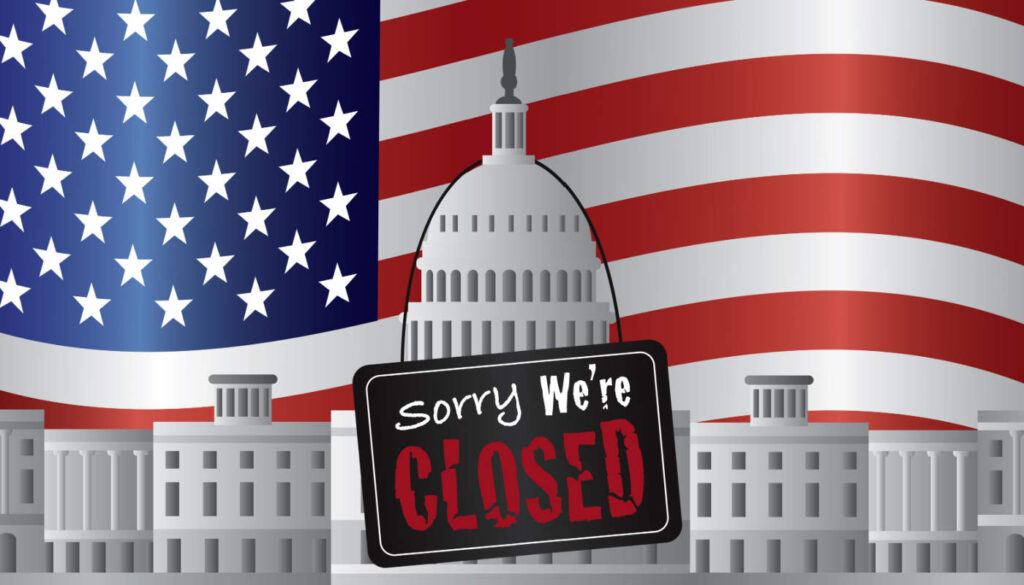By Robert Nichols | rnichols@nicholsliu.com | (202) 846-9801
As the government faces yet another shutdown, we want to provide a quick primer on steps to take to prepare.
Why Is the Government About to Shutdown?
The U.S. Constitution and the Anti-Deficiency Act (31 U.S.C. § 1341) prohibit the government from spending money that has not been appropriated by Congress. Congress enacted the most recent appropriations bill in December 2022. That bill funded the government through the next fiscal year. The fiscal year ends on September 30, 2023.
Congress cannot agree on funding levels for the 2024 appropriations bill. Often, when Congress can’t agree on appropriations, they pass a continuing resolution to temporarily funds the government at the previous year’s levels. If Congress doesn’t enact an appropriations bill or a continuing resolution by September 30th, most government operations will cease.
What Happens When the Government Shuts down?
During a government shutdown, agencies suspend all non-essential discretionary functions. Each agency develops its own shutdown plan. These plans delineate which essential services will continue. Generally, services related to public safety—e.g., law enforcement, medical care, border protection—are deemed essential. Federal employees handling essential functions will continue to work. Non-essential employees, however, will stay home.
Absent a stop work order from the contracting officer, federal contractors must continue performance during a shutdown. Performance issues, however, will be inevitable. For starters, payment will likely be delayed. Agencies can’t make payments without appropriated funds. In fact, the federal employees who process payments for any given agency could be furloughed.
In addition to payment delays, contractors should expect performance disruptions. Many federal facilities will close, so contractors won’t have access to the worksite. Also, contractors will not receive approvals for deliverables or timely directions from the agency during a shutdown, which will cause delays.
Moreover during a shutdown, all, procurement activities cease. Agencies will not issue solicitations or award new contracts. You’ll need to sit tight if you’re waiting to hear back on a proposal. Additionally, existing contracts will be in limbo. Agencies will not modify contracts or exercise options during a shutdown.
What Should Contractors Do to Prepare for a Shutdown?
- Review Agency Shutdown Plans – Several agencies have enacted plans that set forth how the agency will operate during a shutdown. The Office of Management and Budget collects them here. Review these plans for agency-specific guidance on contracts.
- Communicate with the Contracting Officer – Reach out to your contracting officers to ask for instructions. Work with them to create a shutdown action plan. An action plan approved by the contracting officer will prevent future headaches.
- Stop Work Only if Necessary – The general rule is, unless the contracting officer directs you to stop work, you must continue—even if payment is delayed. If you find that stopping work is necessary due to government orders or otherwise, contact us to make plans for a claim.
- Create Contingency Plans – If a shutdown occurs, you may need to reassign employees and resources. Create plans internally and with subcontractors and suppliers to make this as seamless as possible.
- Prepare Employees – Communicate with employees about the possibility of paid leave or furloughs. Review and be sure to comply with federal and state employment laws. For instance, the federal Worker Adjustment and Retraining Notification (WARN Act) requires employers to provide 60 days’ written notice in advance of a mass layoff. There is an exception under the WARN Act for “unforeseeable business circumstances.” But it’s not clear a government shutdown qualifies as an unforeseen circumstance.
- Prepare for Claims – Delays in payments or impacted performance may entitle you to an equitable adjustment or give rise to a claim against the government. Track and document the cause of every delay and all increased costs. Losses caused by a shutdown are likely reimbursable. Recovery of these funds will be easier with detailed, well-organized records.
If you have questions about the possible shutdown or need assistance creating a shutdown action plan, Nichols Liu can help. Please contact the author of this article or the Nichols Liu attorney with whom you regularly work.
